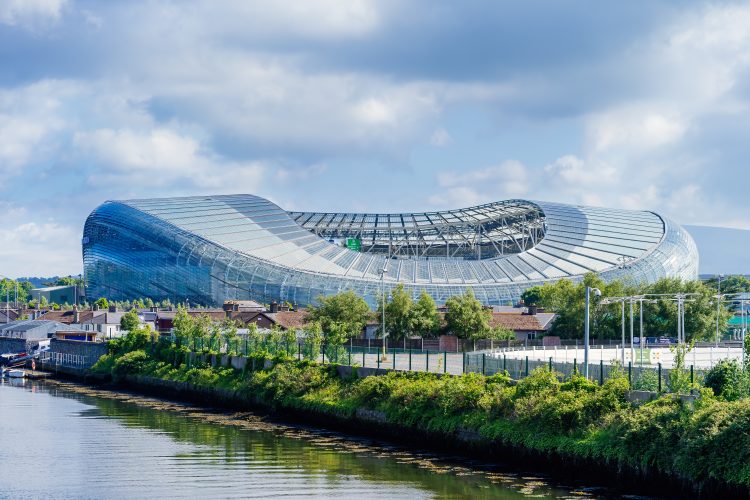EFFoST 2022: Dublin’s holistic approach
- Like
- Digg
- Del
- Tumblr
- VKontakte
- Buffer
- Love This
- Odnoklassniki
- Meneame
- Blogger
- Amazon
- Yahoo Mail
- Gmail
- AOL
- Newsvine
- HackerNews
- Evernote
- MySpace
- Mail.ru
- Viadeo
- Line
- Comments
- Yummly
- SMS
- Viber
- Telegram
- Subscribe
- Skype
- Facebook Messenger
- Kakao
- LiveJournal
- Yammer
- Edgar
- Fintel
- Mix
- Instapaper
- Copy Link
Posted: 27 October 2022 | New Food | No comments yet
Ahead of the 36th EFFoST International Conference in Dublin, Conference Chair Dolores O’Riordan reveals the inspiration behind the varied and comprehensive agenda.


EFFoST 2022 will take place in Dublin's Aviva Stadium
Ahead of the 36th EFFoST International Conference 2022 in Dublin, New Food’s Joshua Minchin speaks to Dolores O’Riordan, Conference Chair and EFFoST board member, to find out more about this exciting event.
What is EFFoST?
Dolores O ’Riordan (DOR): EFFoST is short for the European Federation of Food Science and Technology – and it really is a European wide platform. The whole purpose of it is to facilitate knowledge transfer between all the relevant food professionals across Europe and advance the production of sustainable and healthy foods in an ever-changing world. By its nature, what we’re trying to do is very interdisciplinary. Food science and technology is itself interdisciplinary and we are then trying to connect actors right across the food chain from farm level right through to consumer level.
EFFoST is an organisation that is always trying to create opportunities to bring food professionals together – to share ideas and to make sure that we are really all aware of the newest technologies and opportunities for innovation to address the challenges the food industry faces. That’s why the annual conference is so important.
Do you find it challenging to connect so many different parts of the industry?
DOR: I think in the past, the industry has been quite siloed. Typically, the food production professionals, the food engineers and technologists, the nutritionists, the consumer scientists and food economists worked independently of each other.
The drive in Europe has been towards taking a food systems approach. It is imperative that all the actors along the food chain work together, to make sure we have enough nutritious food to feed the world.
Certainly, I’ve seen a marked improvement in establishing those interdisciplinary connections between different parts of the food and beverage industry.
Turning to the event itself, what inspired the varied and comprehensive agenda?
DOR: Just like the food systems approach, we wanted the bid (to hold the conference) to be as holistic as possible. We wanted to make it meaningful.
To refer to the point about silo-ing earlier, in the past EFFoST would’ve been known mainly for its focus on food engineering and food technology. However, over the last few years the voice of other disciplines and industry has become stronger.
As a result, we were keen to have themes at the 2022 Conference that would attract the nutrition and health side of the industry, as well as the voice of the consumer.
That bit is easy! It’s very aspirational and visionary in terms of what we wanted the conference to look like. Where it becomes more difficult is when all the abstracts come in and they need to be matched to the various programme sessions. One of our UCD postdocs Dr Steven Mulrooney and Co-Chair for the conference Professor Jim Lyng did a lot of the work in aligning abstracts to sessions. That job was made even more difficult as some sessions were over-subscribed!
What’s perhaps quite new this year is the inclusion of the voice of the retailer, the consumer and the food delivery environment. We’ve tried to make the programme as balanced as possible. We’d love to have delivered more sessions, but it’s already a jam-packed two and a half days!
You’re not allowed to have favourite sessions, but between me, you and our readers, you must have a few?
DOR: The way the conference is organized means the first half day is about setting out the challenges and then day two is very much about putting forward innovations and likely solutions. Then on day three, we’ll reflect on those solutions.
What I’m really looking forward to is the final session, which is actually a discussion session. The speakers will reflect on the holistic nature of the food chain and the role of food processing in providing sustainable, healthy foods. We will have speakers from the nutrition side together with the voices of the processor, industry and the consumer.
What does it mean to University College Dublin to be hosting this event?
DOR: We are truly honoured and humbled to be hosting EFFoST2022. The ambition of the conference is very much aligned to University College Dublin’s (UCD’s) research strategy for sustainable, healthy food.
We are really looking forward to welcoming everybody from across Europe and beyond, to Dublin, the home city of our campus. It will be absolutely fantastic to be able to experience some of the world leaders share their expert knowledge and for us show them what Dublin has to offer!
If anybody reading hasn’t booked their ticket yet, why should they?
DOR: This really is an event designed to futureproof the food industry. I think the holistic approach that we’re taking is quite unique and the gathering of expertise will be powerful. You can see from the keynote speakers and the plenary sessions that we really have the top people in science and industry sharing their views.
The event will give our attendees an opportunity to see the best innovations, the opportunity to network and hopefully generate creative ideas. It will enable them to realise that working collectively we can actually implement the changes that will ensure that we have a healthy environment and also have a sustainable food supply that’ll keep the world nourished well into the future.
About the author


Related organisations
European Federation of Food Science and Technology (EFFoST), University College Dublin (UCD)




